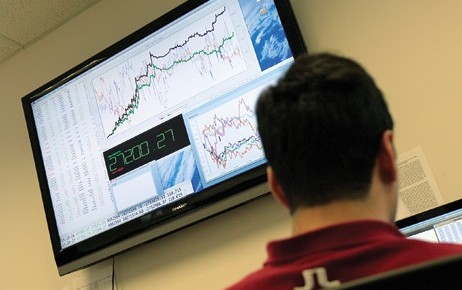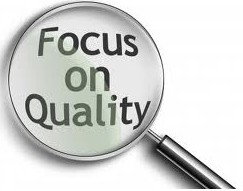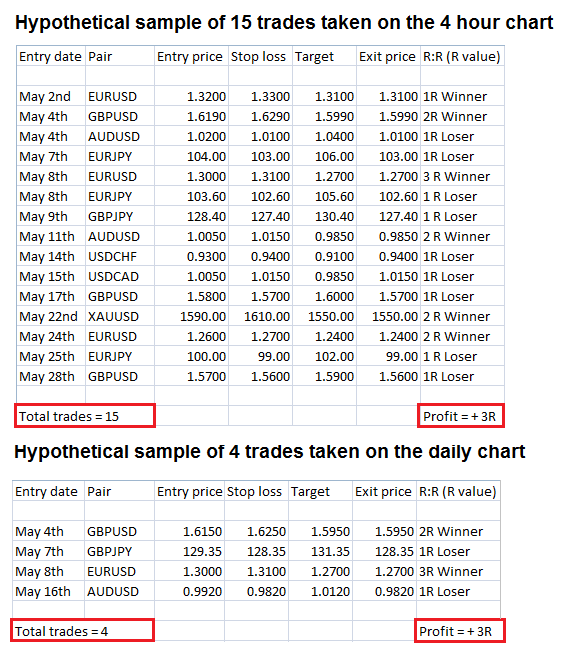Low-Frequency Vs High-Frequency Forex Trading
 Many Forex traders seem to think that by trading more frequently they are opening themselves up to more opportunity and that this will cause them to make more money. This is wrong; in fact, the main thing that high-frequency trading does is cause you to become stressed, frustrated, and take low-probability trades. The truth is that if you know what you’re trading edge is and you are 100% certain of how and when to trade it, you will find that you don’t really need or want to trade that much. There is indisputable evidence that day-traders and scalpers make less money on average than lower-frequency traders. We will discuss that and more in today’s lesson, so let’s get started…
Many Forex traders seem to think that by trading more frequently they are opening themselves up to more opportunity and that this will cause them to make more money. This is wrong; in fact, the main thing that high-frequency trading does is cause you to become stressed, frustrated, and take low-probability trades. The truth is that if you know what you’re trading edge is and you are 100% certain of how and when to trade it, you will find that you don’t really need or want to trade that much. There is indisputable evidence that day-traders and scalpers make less money on average than lower-frequency traders. We will discuss that and more in today’s lesson, so let’s get started…
After you read today’s lesson, please leave me a comment! Tell me if you learned anything in today’s article, and if so, how will you apply it to your own trading?
Quick note: We are strictly referring to retail human-being high-frequency traders in this article, not proprietary commercial computer trading programs or algorithmic trading which sometimes results in thousands or tens of thousands of trades a day.
The quickest way to improve your trading is to…
…Stop trading so much! It is just a fact of human nature that the more we stare at a price chart the more we get tempted to click our mouse button and enter a trade. The fact that we worked extremely hard for the money in our trading account seems to go right out the window after staring at a 5 minute chart for a while. We also tend to over-estimate our own capabilities of predicting the market’s movement as well as ignore the real potential of losing the money we are about to risk.
More trades equal more time and more stress. I personally believe in trading the daily chart with low frequency, meaning I take much fewer trades than most traders. We all know most traders lose money…most traders also trade a lot, so commonsense dictates that simply trading less often (doing the opposite of most traders) will improve our returns over the long-run.
By knowing what your trading edge is and being 100% confident of how and when to trade it, you will find that it’s a lot easier to ignore the market when your edge is not present. When you trade less you can also risk a bit more per trade if you’re comfortable with it. Think about it, one trader trades 30 times a month and the other trades 3 times a month, obviously the guy trading 30 times a month can’t trade as big of a position size per trade as the guy trading 3 times per month. Not to mention that the higher-frequency trader is going to spend much more of his precious time in front of the computer, probably stressed out and frustrated. I prefer to spend less time in the markets and I also prefer to have low levels of stress, thus I mainly stick to the daily charts and I trade relatively infrequently compared to most traders.
 The point is this: when you increase the quality of your trades you also increase the risk reward potential, and rather than fighting against the market you are simply being patient and acting only when the market shows your edge. This will work to accelerate your profits whilst spending less time in the markets. It’s sort of counter-intuitive, because in most professions more time = more money, that’s not so in trading, in fact most traders do a lot better by spending less time in the markets. Thus, you need to fight the urge to over-analyze, over-trade, or trade on low-time frames charts.
The point is this: when you increase the quality of your trades you also increase the risk reward potential, and rather than fighting against the market you are simply being patient and acting only when the market shows your edge. This will work to accelerate your profits whilst spending less time in the markets. It’s sort of counter-intuitive, because in most professions more time = more money, that’s not so in trading, in fact most traders do a lot better by spending less time in the markets. Thus, you need to fight the urge to over-analyze, over-trade, or trade on low-time frames charts.
Low-frequency vs. High-frequency; An example
Do you want to increase your overall R-factor whilst reducing your stress and emotion in the markets? R-factor is basically your profit factor, and it’s how much money you make over a period of time in terms of your risk (R) per trade. So, if you risk $100 per trade, your R-value is $100; if you made $500 in one month that would be a 5R return. This is how you should think about risk and reward, not in terms of percentages. Percentages don’t really matter because a 50% return could mean you made $50 dollars or that you made $50,000 dollars…you see percentages are relative to your account size, what matter is dollars risked vs. dollars earned. If you are looking to build a consistently profitable track record to try and get an investor to fund you, they are ultimately going to be concerned with how many dollars you have returned relative to what you have risked.
In order to show that higher-frequency trading does not equate to higher overall profits, let’s look at a hypothetical example of a trader who over-traded on the 4hr charts during one month versus a trader who traded less-frequently on the daily chart for the same month. The key point to take away from the example below is that both traders ended up with a 3R return for the month of May, but the first trader traded over 3 times as much, taking 15 trades in the month compared to the 4 trades of the other trader.
You can imagine that the trader who only entered 4 daily chart trades that month had far less emotion, frustration and stress, and far more time and ease of mind than the guy who entered 15 4hr chart trades and ended up with the same result. This is actually a relatively mild example, I know many traders who trade far more than 15 times in a month and lose money still, some of you are probably in that boat right now. So…why not try something different? TRADE LESS:

(Note: these were not actual trades; they are all made up for the sake of example)
So, as we can see from the example track record above, higher-frequency trading does not necessarily mean higher-profits. Obviously, this is not a real track record, but the point still stands; when you take more trades you are naturally going to have to endure more losing trades which will need to be offset by more winning trades just to achieve the same profit factor. Note the guy who traded the daily chart had a 50% win rate with the 4hr trader had only a 40% win rate.
Treat The Market Like A Garden
It might help to think about the market as a garden, and each month there are a limited number of vegetables that the garden produces, but there are a lot of weeds. The more vegetables you take out of the garden each month, the greater the chance you have of pulling a weed next time. In trading, there will typically be a limited number of high-probability / obvious price action setups each month, so if you don’t have the patience to only trade those obvious setups, you’re going to end up getting more losing trades (weeds) than winning trades (vegetables).
The science of why people trade too much
Whilst the reasons why people trade too much can be many and varied, the primary reason is over-confidence. This is especially true after a winning trade or a series of winning trades. Traders tend to become over-confident after they hit a nice winner or winners and especially if they aren’t following a trading plan and are just trading off the ‘seat of their pants’. There is considerable scientific research that backs up the claim that most traders trade too often due to over-confidence. Most people over-trade due to “overweighting” their winning trades as Terrance Odean and his colleagues pointed out in their research titled Do Day Traders Rationally Learn About Their Ability?…
However, when they are successful, these investors irrationally attribute success disproportionately to their ability rather than luck, leading investors to overestimate their own abilities and trade too aggressively; even investors with more past failures than successes may become overconfident by over-weighting their successes.
Odean and company go on to discuss how the “aggregate performance of day traders is negative” and his research also underscores the fact that trading low-time frames and high-frequency trading become very addictive. Trading addiction is the only way to explain the fact that “over half of day trading can be traced to traders with considerable experience and a history of losses”, as quoted from their research. Why else would a day-trader with ‘considerable experience and a history of losses’ continue to day-trade if not for being addicted to it?
The primary thing to take away here is that you have to AVOID over-weighting your winning trades…they do not imply that you are “figuring it all out”…rather they should just be viewed as another execution of your edge. Remember that even if you are a trader who wins 70% of the time, you still never know which trades will be one of the 70% or when one of your 30% losers will pop up, thus you should never over-leverage your account or over-trade it…just trade when your edge is present, and over-time you should make consistent money.
• Men vs. women
Now, I know that most of my readers are men, but the fact of the matter is that we are going to have to swallow our pride a little bit here and take a play from the women’s trading handbook.
According to a recent article on the New York Times website, men have a tendency to trade far more frequently than women, which works to drive up their costs and lower their overall returns, see here:
This added trading drove up the men’s costs and lowered their returns. The economists found that while both sexes reducednet returns through trading, men did so by 0.94 percentage points more per year. In a telephone interview, Professor Barber said, ‘In general, overconfident investors are going to be interpreting what’s going on around them and feeling they are able to make decisions that they’re really not equipped to make.’ Short-term financial news often amounts to little more than meaningless ‘noise,’ he said. Far more than women, men try to make sense out of this noise, and to no avail.
So, there are a couple important lessons to learn here:
1) Men tend to think they “know” what the market is going to do whereas women are more likely to accept the fact that they don’t “know” for sure what the market will do. The fact is that the women are right; no one ever “knows” what the market will do except for insider-traders with illegal information. So, the sooner you accept that trading is just a game of probabilities where the outcome of any setup is never “certain”, the sooner you will stop taking low-probability trades only because you feel like you are “sure” about what the market will do next.
2) Women are less likely to get obsessed with financial news and in trying to “figure out what it all means”. Men need to be more like that on average, if you don’t know why then please read my recent article on forex news and fundamentals.
I personally believe that women have less of a need to “be right” all the time than men do, this also makes them better traders. The market does not care about you or your little feelings, so being right and wrong and having an ego about your trading are all totally irrelevant things to your bottom line. Leave your ego at the door when you enter your trading room, because it’s NOT going to help you make better trading decisions; you can think you are right with every ounce of your being, but the fact is that the market doesn’t care if you think you’re right or not, it’s going to do what it wants because THE MARKET is always right, not you. So, learn to trade according to these facts and not in conflict with them, we can do this by simply learning to read the price action that the market produces for us and only trading when our high-probability price action trading setups are present.
Final thoughts…
Perhaps the core idea to take away from this lesson is that you should not assign too much significance to any one trade. Meaning, don’t start over-trading just because you become overly-confident after hitting a few good winners. Remember, you can achieve the same overall R factor over the same period of time by trading less frequently. You can do this by focusing on quality of trades rather than quantity of trades. If you want to learn more about how I trade ‘Low-Frequency’ price action strategies on the Daily Chart time-frames; check out my price action trading course and member’s community; my trading philosophy is based on trading only the highest-quality price action trade setups, which means less trades and less stress!
Works Cited:
How Men’s Overconfidence Hurts Them as Investors






Dear Mr. Nial Fuller:
I have started journey to learn all you articles, In one word it is very impressive guidelines. After reading all topic, then I will join your upcoming advance Course of Price Action. Thanks
Thank you sir for this article, I hit few winnings today on the 1hr timeframe chart but I could feel the stress and the urge to trade more so am stopping it and moving to the daily timeframe chart. But my question is this; Can a trader still give out signals on the daily chart trading less frequently?
Good article! Thanks
Hi, Dear Nial,
Whenever I have a stress and think to review myself about trading, I refer your articles. Thanks
Excellent article nial. We all have to wait for the establishment ups. Pin bars…engulfing candles in the right places etc. Now I tell myself to only look at the daily tf.
Thank you sir.
Thanks for the artitle,
Nial, I agree with your thoughts in principle. However price action is “price action” no matter what the time frame. A valid set up results in a valid trade on what ever the time frame the chart is. Of course the lower the time frame the lower the amount of risk and of course the lower the amount of potential profit. But the higher time frames will naturally give less “noise” on the chart and less noise results in less stress and frustration.
So in the final analysis the higher time frame would be the optimal time frame for most traders, especially the ones like me with little experience. (Yeah, I think that is exactly what you said in the first place!)
Thanks for another fine article. You have a unique ability to rattle my brain and make me think more with each article.
Krek
Hi Krek. Your statements that ‘price action is price action no matter what time frame is NOT correct’ The significance / weight’ of the daily time frame signals are far superior to the 1 hour or 5 minute chart. A trader does not have to risk more on higher time frames, they can simply adjust the trade position size accordingly. You are correct in saying ‘the higher time frame is optimal for traders’, I agree.
Have read through the course several times and it has helped enormously. Waiting for quality PA set-ups as Nial has taught really does help your account as well as your emotions.
Thanks, your advices are very helpful
Hi Nial
Nial thank you for the lesson, me to I had a vision of trading full time not considering a risk of that. You lessons bust my learning skills about trading, thank you again by giving me a confident about small account to trade with as long one has discipline and 100% edge of trading. I still reading your lessons and am fully happy by doing so, the reason I get a lot of indicators trying to convince to learn four hours and start trading, yes I’ll take three to six months to learn about price action. May confidence is growing each an every day when I read your work. My Forex Trading Plan is my first priority to discipline and control my emotion at times.
Thank you
Thabo NtshisiRSA
Hi Nial & hello traders,
Just wanted to say thank you for sharing such powerful information. Following your simple ideas I’ve learnt a huge amount and made very profitable trades consistently.
Once again thank you :)
Thanks Nial. I haven’t started trading as yet live or using a practice account. Decided 3 weeks ago to go into forex trading and to date all I have done is read on different aspects of what is involved. Your articles are among the most insightful yet so simple to follow and understand that i have read.
I agree with you on this because recently I have been trading much and just as i made the money so i lost everything.But i was thinking that as a new trader when I trade everyday I get more experience.
You’re exactly right Nial. I got more losers from overtrading. Can’t control myself. I hope this lesson gets drilled into my brain.
Thanks a lot
I have read this cool lesson and understand it. I will trade less now
As always an excellent article! This article was written just for me. Especially agree with this: “Whilst the reasons why people trade too much can be many and varied, the primary reason is over-confidence. This is especially true after a winning trade or a series of winning trades.” Thank you, Nial!
Hello Nial
I’m very grateful for the clarification of trading in higher timeframes, it helps me a lot because doing this you learn to be patient, the patterns are a lot more clear, and you don’t lose the money doing quick trades of 30 minutes and then looking the 4H TF and seeing that the trend was against you.
Cheers
Hi Nail,
I have been reading through your articles and I must say they are very interesting. BUT… There is something I don’t really understand about this high frequency vs low frequency trading.
The FACT is that most people come out with huge profit at trading CONTESTS organized weekly by brokers. If they only trade Daily charts and less trades, HOW are they able to perform so well within FIVE(5) DAYS? I also noticed that some of their trades lasts as little as 10mminutes. Your thoughts please….
Thank you Nial for the sharing! finally shed sum light, will continue trading the higher time frames despite popular beliefs!
the point i got here is about the quality of our trade, it makes sense.
Thanks a lot.
Thank you Nial for the great lession.
After reading this lession, I checked my trade journal. I have made 21000 rupees from daily chart but only 1900 from H4 charts. That clearly shows trading low time frames is no use.
Once Again great nial, this artical guide me a lot so what onne should follow 1 min 5 min 15 or 30 min chart.?
Thanks Nial, This article was written just for me. It was my story last week when I was over confident and tried to guess what the market was going to do. Too many times I guessed wrong. Thanks again
thanks Nial, your articles are always very inspiring and sobering.After reading them I always feel like, I can do this, its not as difficult as it seems. I realize I almost became an addict,and this is just the right diagnosis and prescription.
Thank you.
Great work Nial,I always look forward to your articles.
Thanks Nial.
hi nail, its great thing u r doing, after studying ur idea’s i feel free in market techniques, now i changed my tactics thanks for u
I think i have gotten another wepon to takle this market thanks.
Another great article. Many thanks Nial.
Less is more thanks Nial.
hi Nial, very interesting. But what would a full-time trader be doing most of the time if he only trade so less, like 3-4 trades a month, and why do they have multiple chart screens, when i think they only need one and just flip through different daily charts one or twice a day.
just wondering, because i want to became a full-time trader
Hey Nial, very wise indeed. This past week was a case in point, in that there didn’t seem to be too much going on as most markets seemed to be consolidating.
As a result I started getting restless and traded a range even though my gut told me to stay out. Obviously it was a loser and I had to be humbled to learn my lesson – BE PATIENT AND WAIT FOR THE EDGE TO APPEAR! Thanks again Nial for all your priceless advice.
I got your memo a long time ago. “ONLY TRADE HIGHER TIMEFRAMES.” I still only trade off the daily. Thanks
, Nial!
To finish my thought …. Over trading is usually not a “plan”
Very true …
It makes so much sense to develop our plan ahead of time and stick to it, before we let our emotions “get involved”
Great article Nial! I like what I’ve seen of your lessons over the past few months so much that I signed up for your course today. I especially like the way you cut to the heart of the subject with the least amount of noise.
Chuck Solomon
Dear Nial,
There is no doubt in my mind that your life’s work and teaching are on the level of a doctorate.
Thank you so much Dr. Nial.
Sincerely,
John G
Hai neil ,You may be right.But I want to enjoy the pain,tension and joy of each trade .Trading has become a craze for me.Of course I am a loser you can guess .But I enjoy trading
Very nice article Nial, informative with some hidden truth…. thanks
Thank you Nial for this detailed exposition, keep up the good work.
Regard Milton
Thank you Nial, very usefull.
Thats one of the things I have to work on.
David
Good morning
I think you are right but I disagree in one or two points.
As always you analyze and give your opinion truly and honestly so thanks
Tq Nial…but i still can control myself…arghhhhh
Another cause of over trading from my experience is chasing previous losses.Which in turn takes ones focus off the process and onto the money. Without fail, this results in emotional errors in trading.
This article is worth reading again and again.In fact i have included it in my drill of continuously monitoring my susceptibility for making errors.
Thank you Nail
I will not talk only based on this excellent article, but talking about all of your work that you made available, that worth a lot more than you ask for.
After going through the course and using your strategies successfully in a demo account for 3 months, I’m now in the second month in a live account with very good results so far. I now feel that at last I’ve found the right way to trade.
Thanks a lot for that Nial.
Makes total sense, especially after last month, which had excellent trend trading conditions. My trades ended up one winner after the other. I know I should not have traded as much as I did last two weeks, but I was so confident after all those winners that I just had to trade: all losers. Looking back the quality of the trades of last two weeks were far less then that of the trade opportunities in may. So yes, I am gonna try and sit tight and wait for those high quality and high probability trades to present themselves.
Hello Nial,
Excellent article…thanks for sharing your market wisdom!
I’ve recently limited how many trades I would take per week and no more after trading that number (for me, it was 5, down from anywhere between 15-20 trades I was taking before everytime I saw a “good setup”). That helped me trade only what I really thought was a really good setup. And it’s helped me tremendously! I’ve been in the plus every week so far! Great stuff Nial! It’s very counter-intuitive but definitely works!
Fantastic article Nial.
Well done!
Superb read, Nial. You can’t stress this subject enough. Keep the good articles coming!
Nial, thank you for this article, and indeed a lot other articles that you write. I am in Africa in a country where currency trading is a very new concept. Reading your articles and practicing your recommendations have always made me a better trader. Over-trading has been a serious problem to me causing me to experience numerous margin calls. I have gone through numerous “hope to disappointment” cycles. But I believe that every article you share increases my hope to succeed! Thank you very much.
I really apprecite your contribution in our life. Before i traded like a gambler but now there’s changes in my trade. Your strategy is simple and straightforward.
Thanks Nial everyday I learn everything new
Resume: Smokejumper, motorcycle racer, catamaran racer, black belt in martial arts. So, my operating philosophy heretofore: go for it!
This is the absolutely wrong philosophy for trading.
Wait, wait, wait, patience. Good lord this is hard, but I’m going to do it.
Much food for thought – I’m going to get my life back!!
just like someone mentioned..indeed it is a rehab for me too, despite the countless warnings l have read in most of your articles about over confidence and overtrading,..I still fell for it..but l the goodnews is patience is gradually settling in as l now wait to see the edge before pulling the trigger,..now my account is more stable after blowing many accounts…Tnks Nial for coming across my path!!!
Nice work nial.as always in fx less is more if you have your edge. thanks for your insight and wisdom.
Thanks again for a great article Nial,
What stands out most for me is the position size. I’ve been trading intra day because I believed I would have to have a very large account to make any real profits on daily or weekly time frames sticking to a one percent rule. This will take a bit to get my head around, I did the maths on risking 1% compared to 2% or more and it works out that because the drawdown is less with less risk, I can be more profitable only risking 1%. ??
Hi Coach,
You are right on point .I traded too many times in my first months. practically taking off duty to look at charts. Those were the days i lost the most. Hadnt discovered you by then. I later came to agree with this lesson . the fewer the trades,the better the results.
These days, i scan the charts for only 10 minutes. if nothing is sticking out, thats it for the day. Thanks so much
Hey Nial,
As a relatively new trader things that have contributed to the downfall of my first demo account are:
No trading plan
No trading diary
Seat of my pants or gut feel trading
Over trading
and
greed!
For me being able to recognise where I have gone wrong is a huge advantage which I will absolutely be making use of.
Nial is right, over trading is stressfull and time consuming so I guess if you feel yourself going for that trade the is without edge – DONT DO IT!
Si.
Another great article, thanks so much Nial keep up the good work!
that trader in the article was me till I joined your course 2 weeks ago – in that time I have taken only 2 trades, both winners, prior to joining you I would be taking an average of 7 trades a week, bumping up my lot size after a few winners and then losing the profit by the end of the week. PA and patience, I am learning. thanks Nial
This couldn’t have came at a better time. This was an extremely important lesson for me. I took a trade on the London open this morning. Went well, captured 46 Pips, should’ve stopped. 17 minutes 46 pips great trade, then go have a nice rest of the day, Right? Well, I should have but Greed kicked-in. Well, let’s just say I learned my lesson. I have also realized for myself by real trading that what you said here in this article is very true and honest. I’m going back up the the Daily again and getting my life back…no more stress…. Thanks, Nial…. Mike
Well said Nial, I have been thinking about this topic as well. and must say I have only taken one trade this month on the 4h and it was a winner and i know for a fact that had a taken a lot of trades i would be on the red. Thanks Nial you are my Master.
I’m beginning to think i will set up my wife with training and a trading account. You’re spot on Nial. Thanks for sharing.
Excellent article Nial. My biggest issue is over trading on smaller time frames. And the comments about men vs. women is very interesting. Have to check the ego at the door. Time to regroup……
Toby
very practical advice.
Another great article Nial. Waiting for high quality setups is of fundamental importance. Looking back over the last year, I have certainly found an inverse correlation between the number of trades/month vs profitability.
Curious about trading, I like your approach. Slow and steady, snails rule.
Hi Nial , Hi traders
I certainly do have an ego, why to be hypocrite about it. Said that, one thing is for sure: I would rather by humble and successful than cool and broke how about you, fellow traders?
Nial, I love the “Garden” metaphor…
I am going to paste it onto my Trading Journal
MH
this is a great advice to all traders…simply vow never to open more than one positions at a time, and take ur signals, not from the hourly charts, but at least from the 4hr chart.
I have this to say; I found this site when I was contemplating quitting forex market after loosing all I have in my account.
But my hope is rekindled and base on what is shared here, I am seriously saving to refund my fx account.
Thank you to the Team
Good article Nial. Especially timely as I was just wondering whether I should devote some time each morning to some scalping/short term trades to balance my long term daily set ups. It is definitely tempting to try and as you say addictive.
Thanks Nial, Wise and timely words.
I’m currently trading lower timeframes because I feel I have more trade management control, but I may change my mind for all the reasons stated. They are psychologically difficult and require much discipline !
Lovely piece recommended for every trader
Great article, thank you Nial.
I am concentrating on the 4hr charts. I need to start looking at daily charts now .This mmeans reducing my position size .
But also a recent research concludes that day trading is more profitable than trading with weekly or daily charts.Nial,have you seen this report? Thanks for this wonderfull article.
Yeah overtrading is very stressful . We should focus on quality trade only !
Excellent article as usual ! Cheers Nial ;-)
I can fully relate to the over-trading syndrome. I’ve been there in the past and learned the hard way that it doesn’t work for me. I now only trade daily or weekly trade setups. I spend less time looking for trades and feel more relaxed due to their higher probability of success. Old habits die hard but when you get the urge to over-trade take a moment to listen to your rational self. If that doesn’t work turn off your computer and walk away. Over time your will-power will increase to the point that you will no longer feel the need to go down this path.
Thanks for the article Nial. Reflecting on these matters is cathartic.
Excellent article, thank you, the point about how trading can affect one’s mind is really worth noting and remembering.
nice article…nial
thanks for sharing wonderful article.
Great article as always Nial! Trading less frequently on daily charts instead of trading every day on 5 and 15 minute charts has made me much more confident in the trades that I’m entering as I’m only entering perfect set ups, much less stressed and I’m spending much less time in front of the computer and have a higher return on my account! Agree with this article 100%!
this is very useful. congratulation your work.
thank you nial
It is true that overtrading or high-frequency trading are very addictive. Like gambling, overtrading makes you a loser. but it is very hard to resist a temptation to trade everyday. This article is valuable for those who trade often and lose their money. Thanks Nial for the tutorial.
Hey Nial, very wise indeed. This past week was a case in point, in that there didn’t seem to be too much going on as most markets seemed to be consolidating.
As a result I started getting restless and traded a range even though my gut told me to stay out. Obviously it was a loser and I had to be humbled to learn my lesson – BE PATIENT AND WAIT FOR THE EDGE TO APPEAR! Thanks again Nial for all your priceless advice.
Got you nial trade like a girl (LOL). As usual great insight and food for thought less may actually lead to more I definitely think you are on to something.
Thanks Nial. Just what I needed.
I just realised that after turning my $500 account to $1000 last month, it was only 1.5R and I became overconfident to the fact that I made 100%. As a result of my overconfidence, Im currently down $400 and all of the trades were at 4Hr this month.
This article was like a rehab for me.
Thanks Again
-Simar
This is great, thank you Nial. Interesting thoughts about men vs. women traders too.